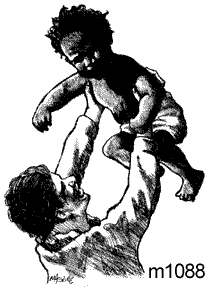
Essay and drawing copyright 1997 by Barrie Maguire

We had love to spare, we told ourselves. It was 1969 and we wanted to adopt a child of a different race. We were sure we had plenty of extra love to give this little girl with the black curly hair and the flashing eyes.
Amy was already eight months old when we met her for the first time at that Wilmington adoption agency. Every time she was passed to me she cried her head off but I didn't care. "Oh, yes, we want her," we sang to the large, serious woman who was offering Amy to us. Just one week later, we brought her home to meet her excited brothers and sisters.
Almost from the beginning, Amy's new life in our house was less than ideal. And after a few months it began to dawn on me that I was feeling fundamentally different about Amy than I was about my other children, my natural children. If Amy's blond, blue-eyed brother woke crying in the middle of the night, I would leap from my bed to console him, to reassure him that his daddy loved him, that he was safe. When Amy cried in the night I would wait a bit to see if she was going to stop before I reluctantly dragged myself from bed. It was the same with dropped bottles, thrown baby food, wet diapers. I didn't feel the same empathy towards her that came automatically with the others. Amy just didn't feel like one of my kids.
I searched my soul for the reason why. Was it because we now had one child too many? Was it because she was adopted? Or, God forbid, was it because of her race?
Distressed, I kept my awful secret to myself.
The night after Amy's first birthday, I lay in bed thinking about her birthday party, her delighted face, her utterly futile attempts to blow out the candle, her fat little fist oozing chocolate icing; if those dear images hadn't turned me around, nothing would. I reached the dreadful conclusion that Amy would never feel like one of mine, that I would never truly love her.
But, please God, she must never know!
I would have to pretend.
Pretend that I was happy to see her, pretend that I enjoyed being with her, pretend that I loved her. The next morning, I lifted her up out of her crib and told her how very much her daddy loved her. The words rang hollow in my ears, but I put everything I had into it, hoping, praying I could fool her. From then on I scooped her up and into my arms at every opportunity, grinning my biggest fake grin, pushing negative thoughts from my mind. "I love you, Amy," I'd say, poking my nose into her tummy or beaming down at her in her crib, "I love you, love you, love you!"
Just as it is difficult to pinpoint the exact moment when the dark of night surrenders to the morning, I can't say precisely when love found Amy and me. But one evening at bedtime, I was kneeling on the floor by her crib, playing hide and seek through the bars. Amy's baby-laughter intermingled with mine, filling the room, when suddenly, stunningly, I realized that I wasn't pretending anymore. The artificial had been made real.
I've been in love with Amy for twenty-seven years now, and she's grown into a tall, beautiful, effervescent woman. I learned from her, my adopted child, that love sometimes takes a while to show itself, hiding in the dark like the sun hides at night. But when love finally shows its face, the sunrise is spectacular.
***
Barrie Maguire is a writer and illustrator in Narberth, Pa.